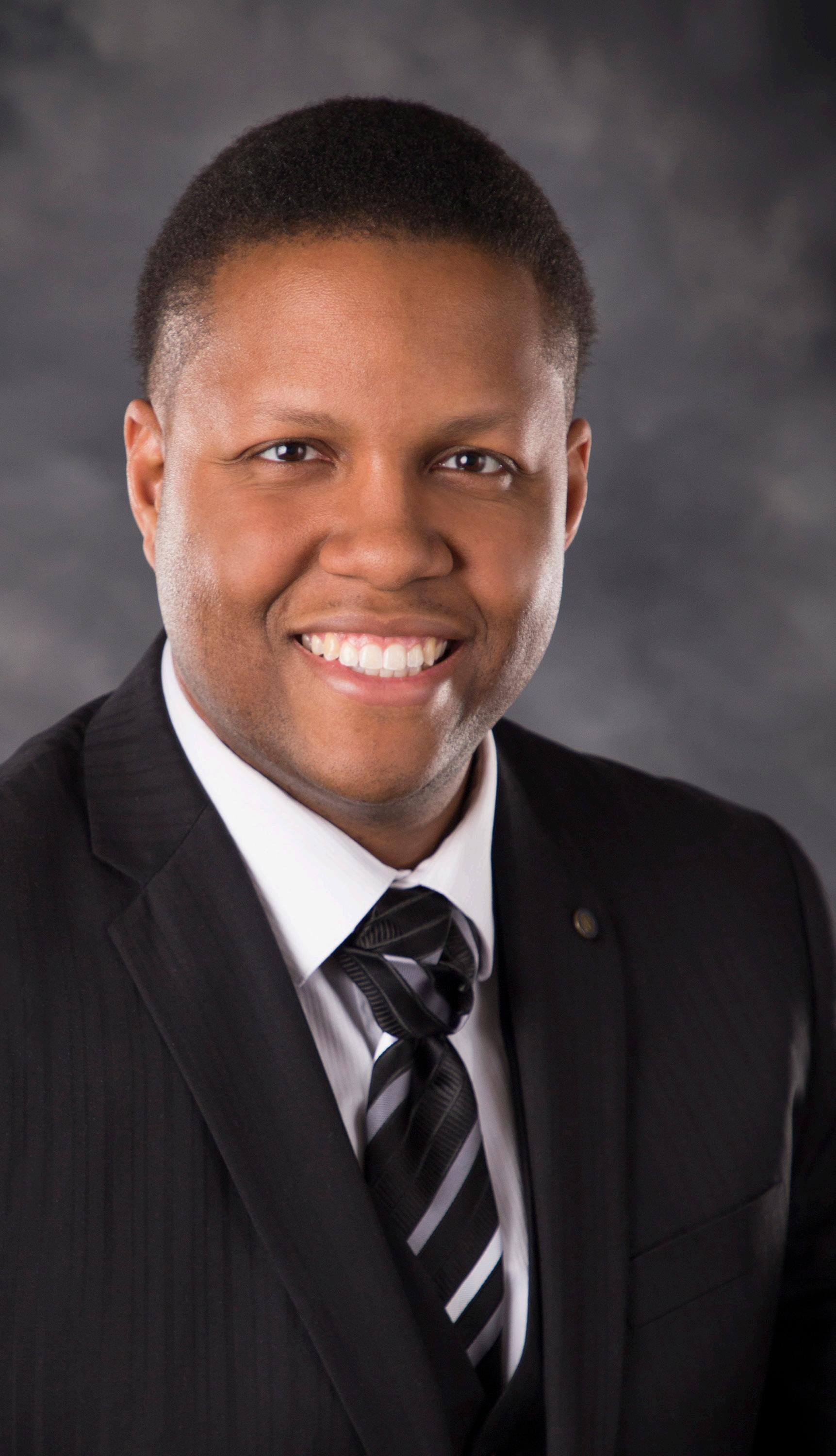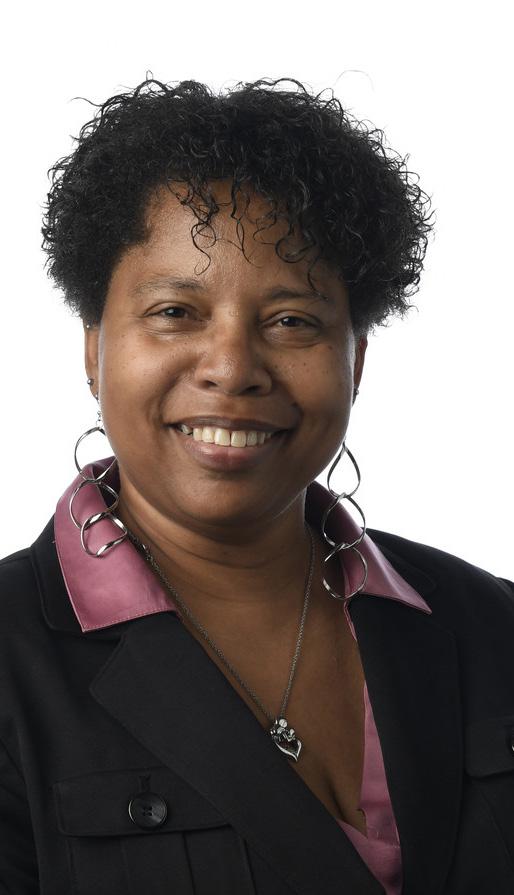
7 minute read
NOMINEES - RODNEY GULLATTE (SPONSOR) JR & KIMBER REESE
Veteran

Advertisement
Rodney Gullatte Jr.
Certified Ethical Hacker
What would be an encouragement for those who may consider joining the military?
One: The military will get what they want out of you; understand that going in. So make sure you have a plan to get what you want out of it, too. open up investment account, start putting this money away. Because if you are coming out of high school and start that investment process by the time you’re 40, you’ll be set. You don’t have to work anymore if you don’t want to.
Two: When it comes to going in, officers versus enlisted, Officers make much more money than enlisted people do, and that follows you depending on how long you stay.
Three: There are different types of people who go into the military. For me, it was supposed to be a stepping stone to weather a bad economic environment. Get what I want and then I’ll get out and go pursue my career.
When you got out of the Military, how was your experience being a military spouse?
It’s a family in the military because we all were all making that sacrifice together. The military spouses that are married to the active-duty military persons sometimes get forgotten. The whole system is set up for the military spouse to be a female. I was a male military spouse. I was the one at home with the kids braiding hair and cooking, taking the kids back and forth to school, while my wife was in another country. I had to hold it down. There wasn’t stuff for the military spouse men to do, so I created my own environment. I want to encourage military spouses, both men and women. If you’re going to be that military spouse at home with the kids, that doesn’t have to be the end-allbe-all for you.
Read Full Interview at
myblackcolorado.com/military
Kimber Reese

Why did you join the Military?
Growing up, I spent a lot of time with my maternal grandparents at their house. My grandmother had the most beautiful photo of her in her Army uniform: it was old from age, but the image of her was soft yet brilliant and strong. My grandfather used to regale us children with stories of him serving as a musician and man of the cloth in the Army (which is where he met my grandmother). Their stories, along with that photo of Miss Christine Rodgers made me want to fill their shoes. Two years prior to my senior year in high school, my eldest brother signed up for the Marines. He looked smart and assured in his photo. So, by the time I got to high school, I think I was calling the military before the recruiters actually showed up. I even took a semester of Army JROTC and absolutely LOVED the discipline and camaraderie. I was going all out for the Marines. But then my ASVAB results came in - I had aced it all - and the Air Force just appeared one day out of the ethos and the Marine recruiter must have gotten lost in another dimension; never saw him again. LOL!

What did you learn from the Military?
As for the biggest lesson I learned while serving, I would say that there are no excuses. You do the job and are recognized for success; you mess up and take accountability, relearn, and keep going because the world is not going to throw you a pity party. Life cannot go on hold so we can feel better. We have to find our stride in the midst of our trials. But as a wonderful side effect of this, I learned more about myself and what I am capable of when I go outside of my personal comfort. This lesson sticks with me today. I don’t make excuses: I will give facts, find the work around, then keep moving forward. My time in service definitely made me a better person because of this ability to find a way.
Read Full Interview at
myblackcolorado.com/military
disabled veteran | 2 years in the u.s. Air Force Space Command

Veteran | 23 years in the u.s. Air Force

Read Full Interview at
myblackcolorado.com/military
RoBrandon Lee
What did you do in the service?
My first 4 years in, I did Production Management. 2 years of that, I managed tracking and scheduling maintenance for A-10 and F-16 jet engines. The next 2 years, I tracked and scheduled maintenance for F-15s while also scheduling the jet’s availability to allow pilots to maintain their flight proficiency. The next 20.5 years, I performed a litany of jobs within the communications field. I installed, maintained, and managed networking devices (routers & switches), telephone switches, IT project management and quality assurance.
What was the biggest reason that led you to join the military?
My brother was in the Marines and I initially wanted to follow his footsteps, but he told me I should got into the Air Force. I went to college for a year then decided to take his suggestion.
What advice would you give to others transition into civilian life?
Be prepared for a new challenge. Be understanding that the environment will be different than what you may be used to, sometimes a little more laxed and care-free. Everyone may not be as focused on the goal as you so be patient and do not get frustrated.
What should you consider before deciding to serve your country.
You may not have control of where you move to or what job you are required to perform. You will be people working for you and those whom you work for that challenge you but know there will always be a change so be patient and just learn and grow. There will be great opportunities, feeling just out of your reach, but do not let that stop you. Travel when you can, involve yourself in the community every place you go and challenge yourself to learn as much as you can.

Veteran | 20 years in the u.s. army
Jennifer Yancey
Financial Services
What did you do in the service?
I served in the field of Public Affairs. I was a photojournalist. When I joined in ’95, I did so as a legal specialist, but reclassed. It was a fun ride, but I didn’t appreciate how some people – including some in leadership – didn’t believe in us nor take our field seriously. Telling the Army’s story with accuracy and in a timely manner was no lightweight task. It involves relationshipbuilding, therefore also involves trust. It was our business to continuously inform not only the Soldiers, but the surrounding community that supported us. It was great that we had access to persons, places, and things our peers otherwise didn’t. For me, though (and this became more important the longer I stayed in), since we were so busy telling everyone else’s story, I started making sure I captured my own life as it happened. I didn’t want to look back one day and say I wished I had captured certain moments of my life and career but didn’t.

Has the military made you a better person?
The military is ONE of the things that made me a better person. It has done so is that it showed me I am capable of more than I perceived myself being capable of. I am better than I was yesterday, but I know I’ll be even better tomorrow.
What is your perspective of patriotism?
Patriotism is not about cloth. People get too wrapped up in symbols of patriotism, that they have no idea what it means to be a “Patriot.” To me, patriotism is about standing up for – and defending – what you believe in. But here’s the rub: Your beliefs are not to the detriment of others. They don’t threaten, or invalidate, others’ existence. To be a Patriot is to embrace and educate myself on all the nationalities and ethnicities who built this nation, but were deliberately left out of the history books. To be a Patriot is to somehow help make this world better with the gifts you were given, not sit by and watch it implode. Read Full Interview at





